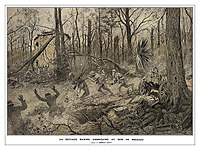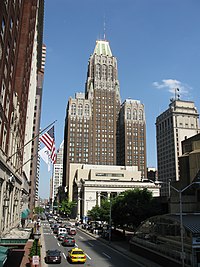Richard F. Cleveland
He was born nearly eight months after the end of his father's second term, and was named for his grandfather, Richard Falley Cleveland.
He was the next to youngest of five siblings: sisters Ruth (1891–1904), Esther (1893–1980), and Marion (1895–1977), and brother Francis Grover (1903–1995).
[2] In 1918, he joined the U.S. diplomatic corps and served in six months in Beijing (then still called "Peking") as military attache at the U.S.
[5] During the Hiss Case (1948–1950), Cleveland represented Time senior editor Whittaker Chambers.
In his memoir, Chambers recalled of him: The names of a number of other Baltimore attorneys were given me from which to make my choice of counsel.
Then I decided on the man whom I had decided on the first time that I read over the list—Richard F. Cleveland, the youngest son of the former President of the United States, Grover Cleveland, and a partner in the Baltimore law firm of Semmes, Bowen and Semmes.Until his name was handed to me, I had never heard of him.
From the moment that I confirmed his intuition and told him what that missing factor was—espionage—he grasped the Case in its full meaning.
His letter, which was handed me by the FBI a few moments before I went in to testify in the first Hiss trial, offering me the support of a shared understanding and the force of his prayers, was a powerful help to me during my public evisceration by Lloyd Paul Stryker.
[5]Cleveland supported the presidential candidacies of Franklin Delano Roosevelt, Alfred M. Landon, Wendell L. Willkie, and Dwight D.
Ellen, a teacher, was a graduate of Vassar College and Columbia University, where she received a master's degree.
[4] Before divorcing in 1940 due to Ellen's alcoholism,[7] they had three children:[8] In 1943, he married Jessie Maxwell Black, the daughter of Capt.

